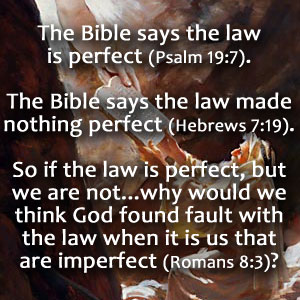Hebrews 6:1-3
New Bible studies and devotionals sent to your email. The first one includes a free gift!
Before you read: This article is part of a larger series that builds on itself from the foundation up, with each study building on the last. If something in this article does not make sense to you or if you believe it to be incorrect please be sure you have read over the entire course before passing your final judgment. Also be sure to visit this page’s FAQ And Objections Page
There are so many people that just do not understand what it means to be a Christian. We are called hypocrites because we preach and teach that you should not sin, and yet we sin. We desire to follow God and do what is right, yet we don’t always do what is right. But, the reality is that we are not hypocrites. We are messengers.
We did not make the laws that everyone, including ourselves, break. We only proclaim what they say. The standard that we set for others is not a standard that we do not set for ourselves as well. That means we are not hypocrites. We want to live up to the standard of holiness. And, while we preach it, we know that we also preach it to ourselves.
But, the cure for the guilty, who attempt to justify themselves by pointing out our sin, is the same cure for us. That cure is acknowledging our sins, repenting, and following Jesus.
Galatians 3:22-24
22 But the scripture hath concluded all under sin, that the promise by faith of Jesus Christ might be given to them that believe. 23 But before faith came, we were kept under the law, shut up unto the faith which should afterwards be revealed. 24 Wherefore the law was our schoolmaster to bring us unto Christ, that we might be justified by faith.
1 Timothy 1:8-10
8 But we know that the law is good, if a man use it lawfully; 9 Knowing this, that the law is not made for a righteous man, but for the lawless and disobedient, for the ungodly and for sinners, for unholy and profane, for murderers of fathers and murderers of mothers, for manslayers, 10 For whoremongers, for them that defile themselves with mankind, for menstealers, for liars, for perjured persons, and if there be any other thing that is contrary to sound doctrine;
As I was saying, we are all guilty. There is no way that we could not be guilty. None of us are made innocent by the law. Because we are too weak to follow it. So trying to be righteous through our own ability is not going to work. We have to be made free from the law.
But first, what does it mean to be under the law?

Those who are under the law are the ones who have not placed their faith in Jesus Christ. The reason for the law is to show them that they need Jesus. They are not under the law because God wants to punish them. They are under the law so that they can learn that they need a saviour. We ALL have to come to Jesus for salvation.
1 Timothy 1:8-10
8 But we know that the law is good, if a man use it lawfully; 9 Knowing this, that the law is not made for a righteous man, but for the lawless and disobedient, for the ungodly and for sinners, for unholy and profane, for murderers of fathers and murderers of mothers, for manslayers, 10 For whoremongers, for them that defile themselves with mankind, for menstealers, for liars, for perjured persons, and if there be any other thing that is contrary to sound doctrine;
Galatians 3:24
24 Wherefore the law was our schoolmaster to bring us unto Christ, that we might be justified by faith.
One verse that I would like to examine closer is 1 Timothy 1:8. We are told that the law is good. Other verses that speak of the law being good and even perfect are Psalm 19:7, Nehemiah 9:13, and Romans 7:12.
Some have made the claim that the law is not perfect and that it had to be done away with because of that. This comes from the following verse:

Hebrews 8:7-8
7 For if that first covenant had been faultless, then should no place have been sought for the second. 8 For finding fault with them, he saith, Behold, the days come, saith the Lord, when I will make a new covenant with the house of Israel and with the house of Judah:
But this does not say that there was a fault with the law. It says there was a fault with THEM. Who is the “them” that it speaks of?
Hebrews 8:9
9 Not according to the covenant that I made with their fathers in the day when I took them by the hand to lead them out of the land of Egypt; because they continued not in my covenant, and I regarded them not, saith the Lord.
It was not the law that was found to have a fault. It was those to whom the law was given that had the fault. So we do not see the Bible say that the law was not perfect. In fact, we see it say that the law IS perfect. We also read that it will not be done away with (as we have already shown Jesus Himself say this).
So now that we know the law remains forever, and is in effect, at least for those under it, we need to know something else.
Exodus 19:5-6
5 Now therefore, if ye will obey my voice indeed, and keep my covenant, then ye shall be a peculiar treasure unto me above all people: for all the earth is mine: 6 And ye shall be unto me a kingdom of priests, and an holy nation. These are the words which thou shalt speak unto the children of Israel.
After these verses, God gives the law and then we are told that this law was the words of the covenant that man must obey. IF man were to obey then they would be holy. But again, man did not keep this covenant to obey this law.
Something you need to understand is that a covenant is like our modern day equivalent of a contract. A testament is like our modern day equivalent of a “last will and testament.” So the Old Testament is actually a contract enforced by blood and death.
But, since man broke the terms of the contract through sin there was no way to inherit the reward of holiness and everlasting life. So God, in His mercy, created a New Testament. The first testament said we had to keep the law in order to be holy. The second testament says something a little different.
Jeremiah 31:31-33
31 Behold, the days come, saith the Lord, that I will make a new covenant with the house of Israel, and with the house of Judah: 32 Not according to the covenant that I made with their fathers in the day that I took them by the hand to bring them out of the land of Egypt; which my covenant they brake, although I was an husband unto them, saith the Lord: 33 But this shall be the covenant that I will make with the house of Israel; After those days, saith the Lord, I will put my law in their inward parts, and write it in their hearts; and will be their God, and they shall be my people.
In the first covenant, the law was written on stone, not in the hearts of man. This meant people had to follow something that was not a part of who they were. For an unrighteous person, it is a burden to follow the law.
But the second covenant is that the law would be written on our hearts. This means the heart of a man is changed and the law of God becomes not only a law to follow, but a part of who he is. The unrighteous man is, in effect, born again as a new righteous man.

The difference is that the unrighteous man is UNDER the law, but the righteous man STANDS ON THE LAW. The unrighteous man will sin and die without God if he doesn’t turn to Jesus. But, the righteous man will not sin, not because he is a slave to the law, but because he is in agreement with the law. In a future unit we will explain that in much more detail.
Romans 3:21-23
21 But now the righteousness of God without the law is manifested, being witnessed by the law and the prophets; 22 Even the righteousness of God which is by faith of Jesus Christ unto all and upon all them that believe: for there is no difference: 23 For all have sinned, and come short of the glory of God;
In the first covenant, we gained our inheritance through our works. But again, we were too weak. The new covenant lets us gain our inheritance through faith.
I would like to say one more thing here. You may be wondering how the saints in the Old Testament could be saved. Well, it was by faith then as much as it is now. The law didn’t just make people guilty of sin. It also gave them a way to be forgiven through sacrifice. Those with a true heart of faith could be justified because of that.
But, those who tried to gain salvation by works alone didn’t even have to believe. We didn’t have to be made into a new person. Our heart didn’t have to be pure. And thus, we could never gain salvation, because good works flow from a good heart.
But those who gain it by faith do so through their belief and actions. Their heart is the first thing that must be changed. They must become pure in heart and from that heart, their works should flow.
Now, this obviously brings some questions. Can a born again Christian do the things that the law calls sin? Would that mean they are no longer Christians? These questions will be answered in the next few units.
Continue To Unit 2:4 – Proof Texting the Bible OR
Return To Christianity 101 Unit 2 – Sin and Eternal Judgment
July 12, 2015 at 8:38 pm | | 1 comment
Thank You Lord Jesus